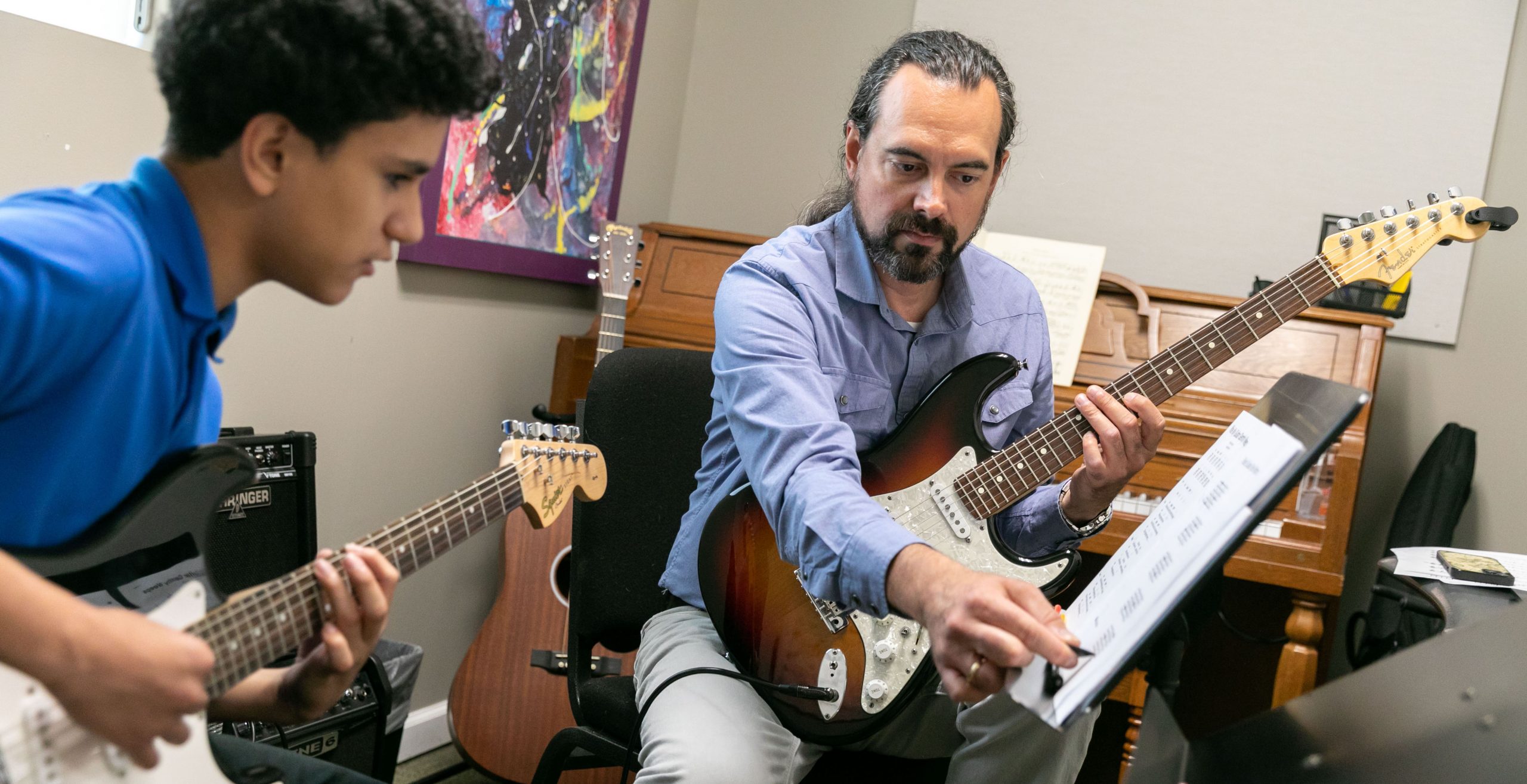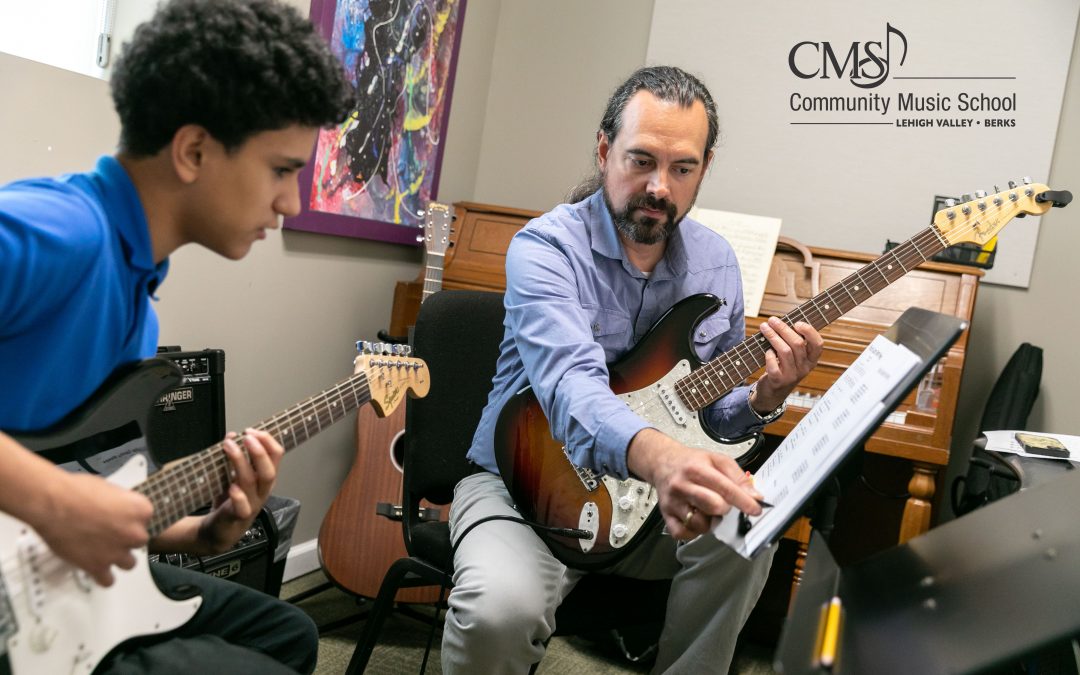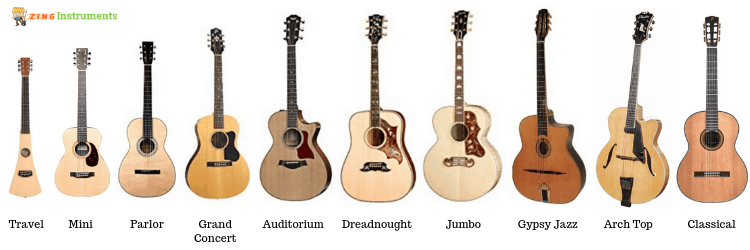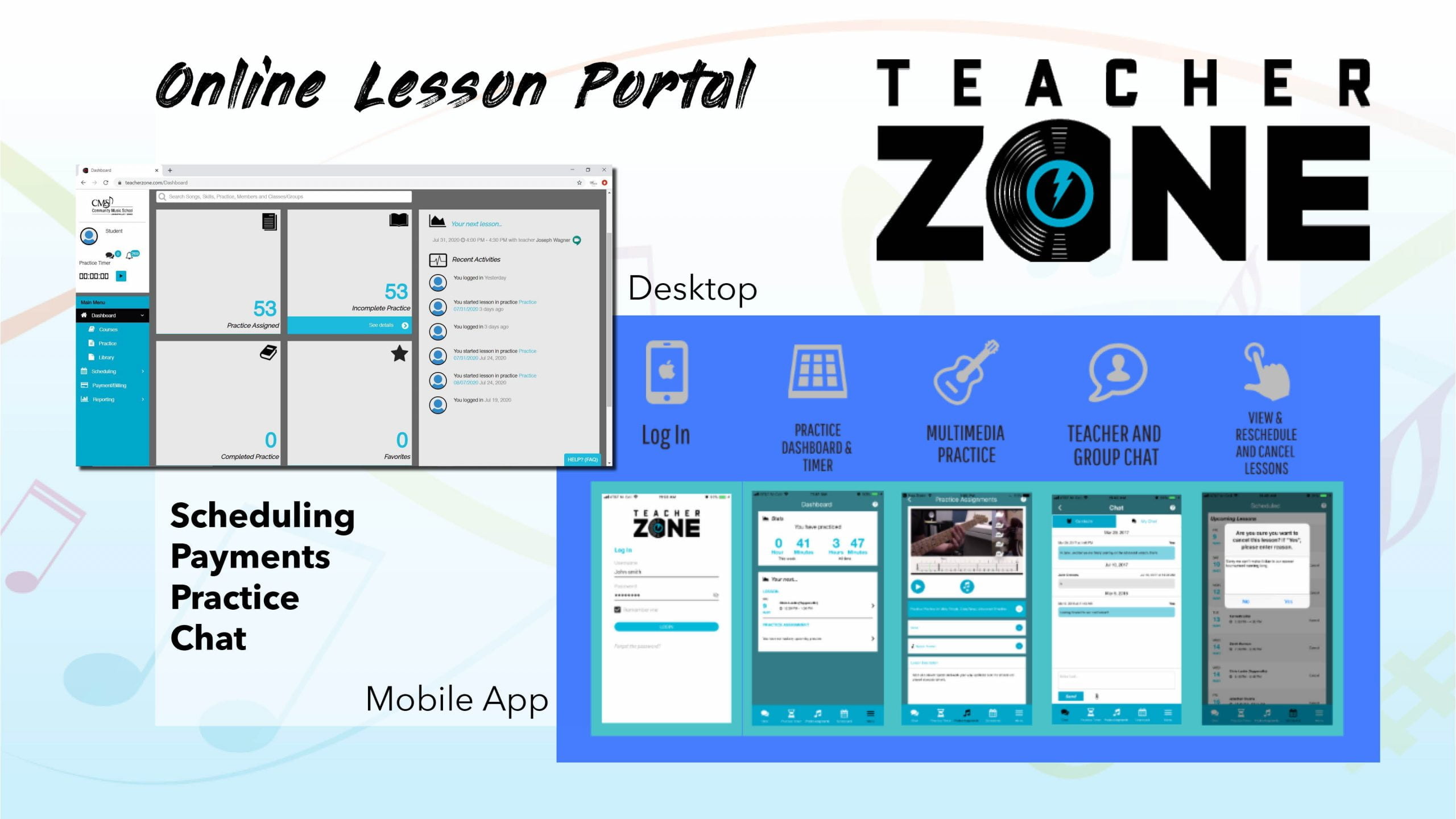Whether you are looking for an in-person music school in the Lehigh Valley or Reading, or a completely online experience, here is everything you need to know about getting started with private guitar lessons at Community Music School.
Sign Up for an
Interview Lesson
- Why learn to play guitar?
- How much will I have to practice?
- Is the guitar the right instrument for my child?
- I just retired; can I still learn to play the guitar?
- What do I need for in-person guitar lessons?
- What do I need for online guitar lessons?
- Where do I buy or rent a guitar?
- How do I pick a guitar teacher?
- What level guitar lessons are available?
- How much do guitar lessons cost?
- Do I qualify for financial aid?
- How do I get started?
- What to expect at the interview lesson
- After the interview lesson
- Do I have to perform?
- How do I know what events are coming up or if my lesson is rescheduled?
- What if I change my mind?
Why learn to play guitar?
Because it’s cool! But if you are reading this, you probably already know that. Acoustic guitars are relatively inexpensive, portable, and sound great around a campfire. Electric guitars are the headliners of the rock band and are just plain awesome.
Besides being cool, learning to play the guitar, or any instrument for that matter, is a workout for your entire brain and body that can produce life-long benefits. Research continues to expand our knowledge of how playing an instrument improves hand-eye coordination, math reasoning skills, language development, memory; it can also help manage anxiety. Over time, these benefits can contribute to academic success, whether or not the student wants to become a professional musician. Performing with a group helps enhance confidence, self-esteem, and connectedness with others. For adult students, keeping the whole brain active helps prevent cognitive decline and helps maintain finger strength and dexterity.
Along with learning how to actually play an electric or acoustic guitar, our students gain a solid foundation in music theory. Understanding the fundamentals of melody, harmony, and rhythm will help you build your playing skills more quickly, communicate with other musicians, and even develop your own compositions.
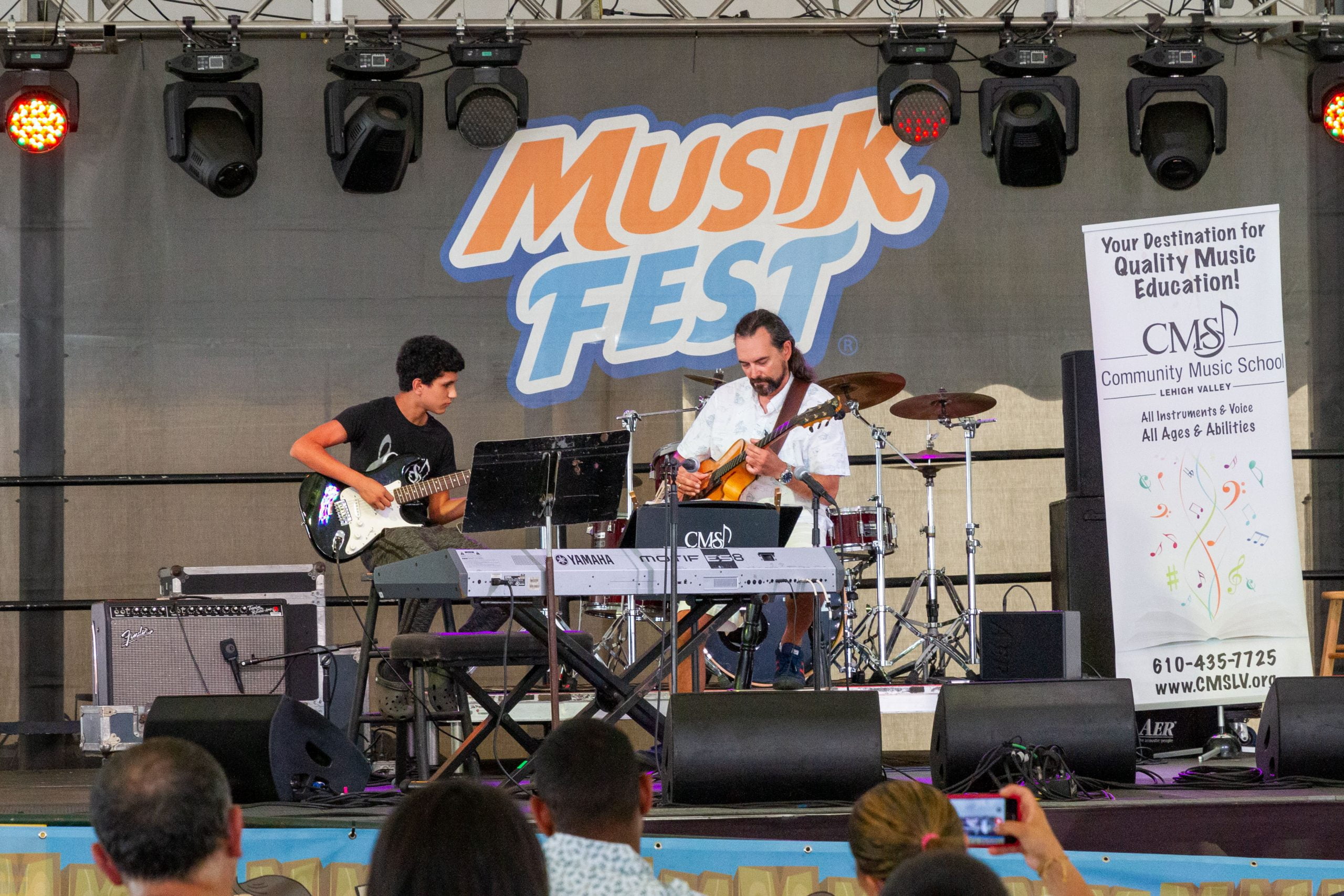
How much will I have to practice?
How long does it take to learn to play guitar? It is often said that it takes 10,000 hours of practice to become an expert in something. While that may not be entirely true, if you want to get good, frankly, you have to practice a lot… correctly… and every day… even a couple of times a day! Learning to play the guitar and read music is basically like learning a new language. The more you practice, the more often you practice, and the more you practice accurately, the faster and farther you will progress.
Practice doesn’t make perfect… PERFECT practice makes perfect!
Younger students tend to learn more quickly than older students, but learning an instrument is a long-term commitment for both child and parent. For young beginners, start with focused practice of around 15-20 minutes per day and set a goal to work up to 30 minutes per day. Depending on the age and attention span of the child, you can divide that daily practice time into several shorter segments. Parents should also encourage “playing” time as well as “practice” time. Your teacher will also use age-appropriate music games to help make practice fun and encourage steady progress.
As you progress to more difficult material, you will need more time to practice. If you plan to major in music in college, you should expect to practice at least one hour per day. For casual adult students, daily practice is encouraged, but may not be realistic for students with families and busy work schedules. You should practice as much as possible, with the goal of at least 30 minutes, 3-4 times a week.
Remember, you set the pace. You will progress as much as you practice.
CMS PRO-TIP
Keep your guitar on a stand, not in its case. That way it will be a visible reminder to you to practice, and you can just grab it and play when the spirit moves you!
These are skills that will stay with you for a lifetime. Be cautious of learning bad habits, such as poor posture and finger position, as this will only slow your progress. This is why having a live teacher to provide individualized feedback is so important. All students can hit a plateau in their progress more than once during their musical journey. Persistence is key to pushing through to the next level. As tedious as learning the fundamentals of music, such as scales and note reading may be, these fundamentals are crucial to developing life-long enjoyment of your guitar. The higher you go, the better the view!
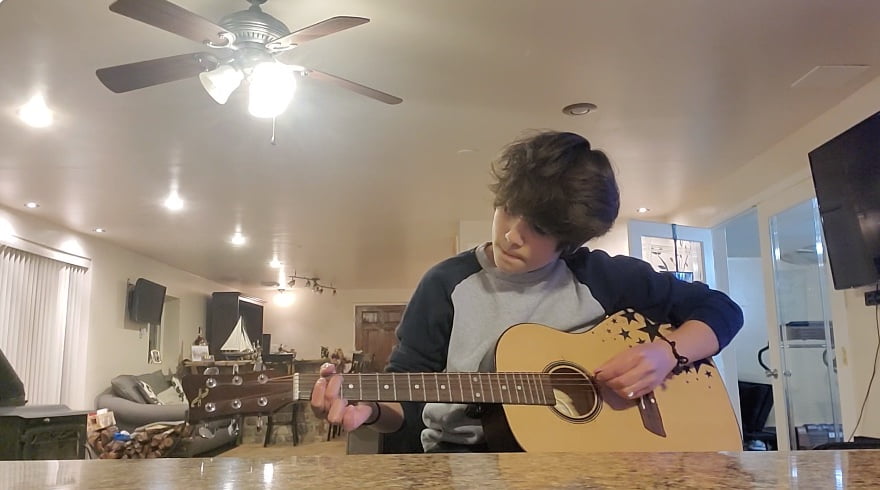
Is the guitar the right instrument for my child?
If your child is interested in learning to play the guitar, is able to properly hold the guitar, and is mature enough to care for it – then, yes, absolutely! Our professional teachers provide age-appropriate individualized guitar lessons; however, most students tend to show more success when starting guitar lessons around age 7 or 8. Many inexpensive, smaller-size, ¾ size, or “parlor” guitars are available at most guitar shops and can be set up to accommodate a smaller player.
For children to be successful in any instrument, the parent(s) must be committed to supporting their daily practice routines and provide encouragement. If you are unsure whether your child is ready, you can sign up for an interview lesson to have your child evaluated by one of our professional teachers. For children under age 12, we require that the parent attend the interview lesson with the child, as well as the first several lessons, at the teacher’s discretion.
If your child is not quite ready to begin guitar, you can plan to try again in a few months or start them on piano or violin (as young as age 5), since those instruments are easier for smaller fingers and allow students to learn the full scale of musical notes. This will help them establish a solid foundation of music theory and make it easier for them to move on to guitar when they are ready. The ukulele is another popular pre-guitar alternative for younger students.
I just retired; can I still learn to play the guitar?
Absolutely! Our professional teachers provide individualized learning, both in-person and online, for children ages 5+, teens, adults, and seniors. About 20% of our students are adults, and many are discovering or rediscovering the joy of making music in their retirement years.
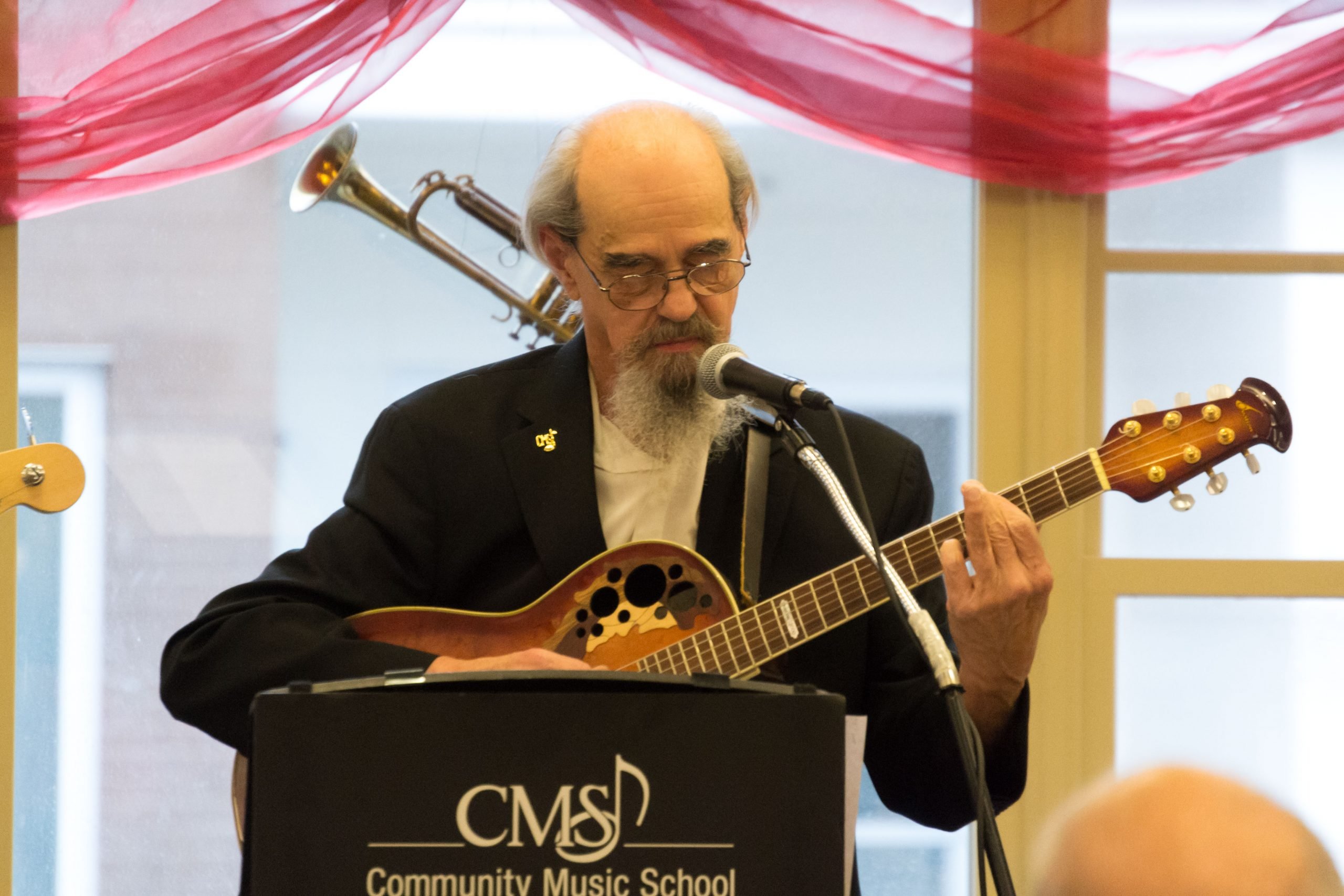
What do I need for in-person guitar lessons?
All students will need access to a properly-sized and tuned guitar to bring to the lesson and for daily practice at home. For the lesson, plan to bring a notebook, pencil, and folder for music and assignments. At home, if possible, create a dedicated practice space that includes a chair, guitar stand, music stand, metronome, foot rest, an amp (if needed), and your music. You should also have access to a digital device for downloading/viewing assignments and recommended videos on our student portal, TeacherZone. For children under 12, we require a parent to be present and actively participate in the lesson.
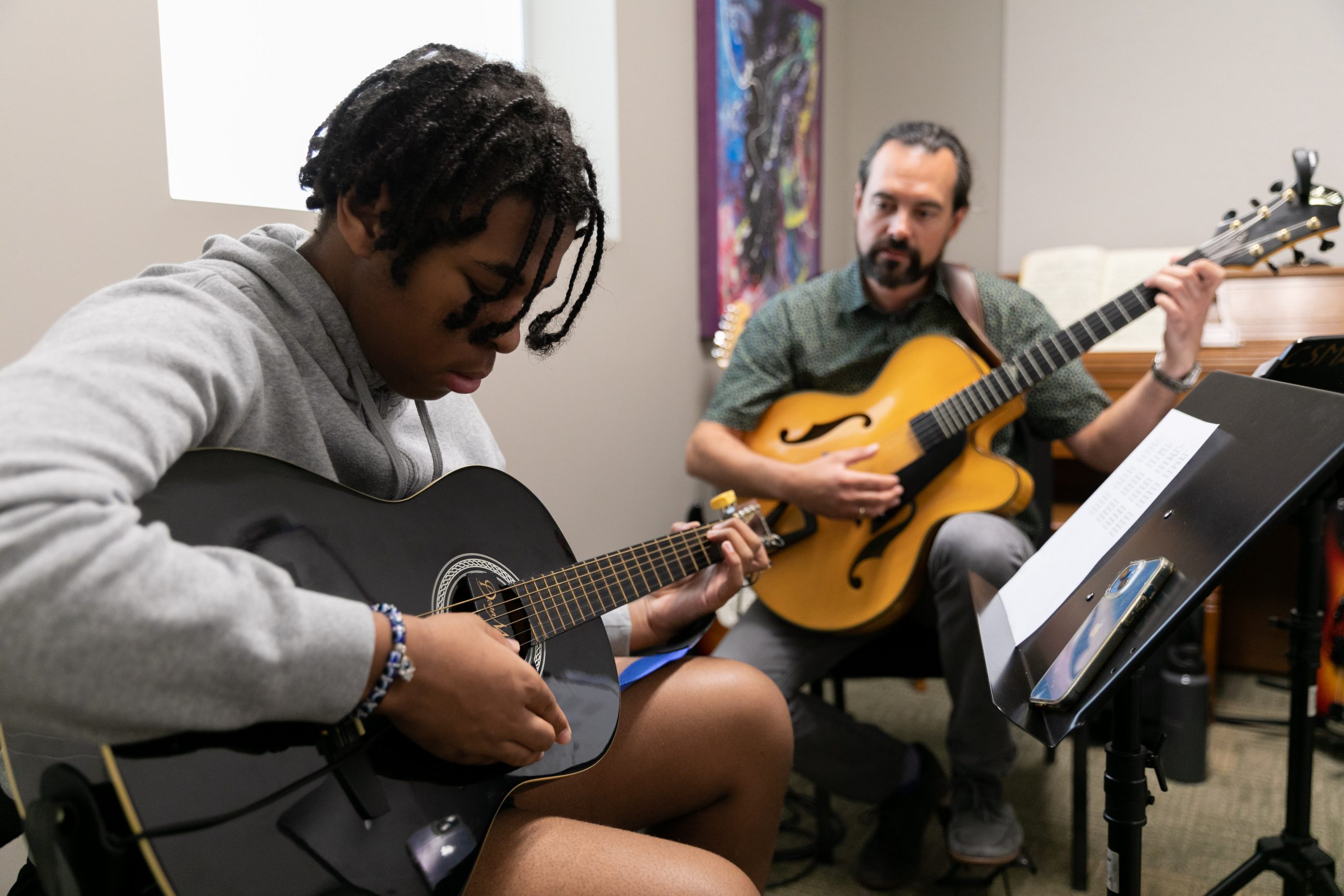
What do I need for online guitar lessons?
Online students will need access to a guitar for the lesson and daily practice, a computer/tablet with a positionable camera, microphone, good lighting, and reliable high-speed internet. Depending on your setup, you might also consider headphones and an audio interface. If possible, you should create a dedicated lesson/practice space that includes a chair, guitar stand, music stand, metronome, foot rest, an amp (if needed), and your music. You should also have a notebook, pencil, and folder for music and assignments.
Your teacher may also create assignments and send you recommended videos through our student portal, TeacherZone. CMS recommends that students use the Chrome browser with a wired internet connection for their online music lessons. Watch the video to learn more about online lessons here. For children under 12, we require a parent to be present and actively participate in the online lesson.
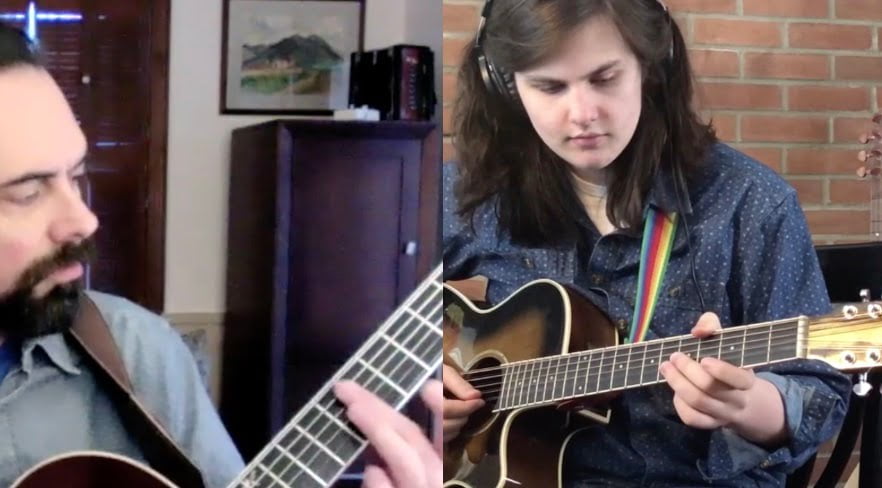
Where do I buy or rent a guitar?
Guitars come in many sizes and styles. The type of music you want to play will determine the type of guitar that will meet your needs. CMS has a collection of donated instruments available for students to borrow for the interview lesson and to rent by the month. Contact the office for availability. Any new or used guitar must be properly set up and tuned specifically for you to produce the best sound and playing experience.
If you are thinking of buying a new or used guitar, or if you inherited one, your teacher will be happy to assess the guitar to ensure that it meets your needs. Your teacher can also recommend one of the Lehigh Valley’s quality luthiers, who can properly configure the guitar for you and make any needed repairs. The Lehigh Valley offers several chain and locally owned guitar stores where you can try out a guitar before purchasing. The size and shape of the guitar must match the size, shape, and strength of the player. Smaller children can begin learning on a fairly inexpensive instrument, but it must be set up with an appropriate string height and weight and tuned to accommodate the size and strength of the child. If not, the guitar will be difficult for the child to play and they will likely lose interest. Once the child demonstrates their commitment to the guitar, they can upgrade to a higher-quality guitar. Also, don’t forget to purchase a carrying case, guitar stand, music stand, metronome, and footrest.
CMS PRO-TIP
Buy a stand-alone METRONOME. The one on your smartphone is convenient, but allows for too many distractions, for both children and adults!
For electric guitars, you will also need an amp to practice at home. CMS has amps available at its studios for use during in-person lessons. Again, the type of music you want to play and the live performance venue you aspire to will determine the type of amp you should purchase. Since the technology for amps is continuously improving, be sure to ask your teacher for recommendations when you are ready to purchase.
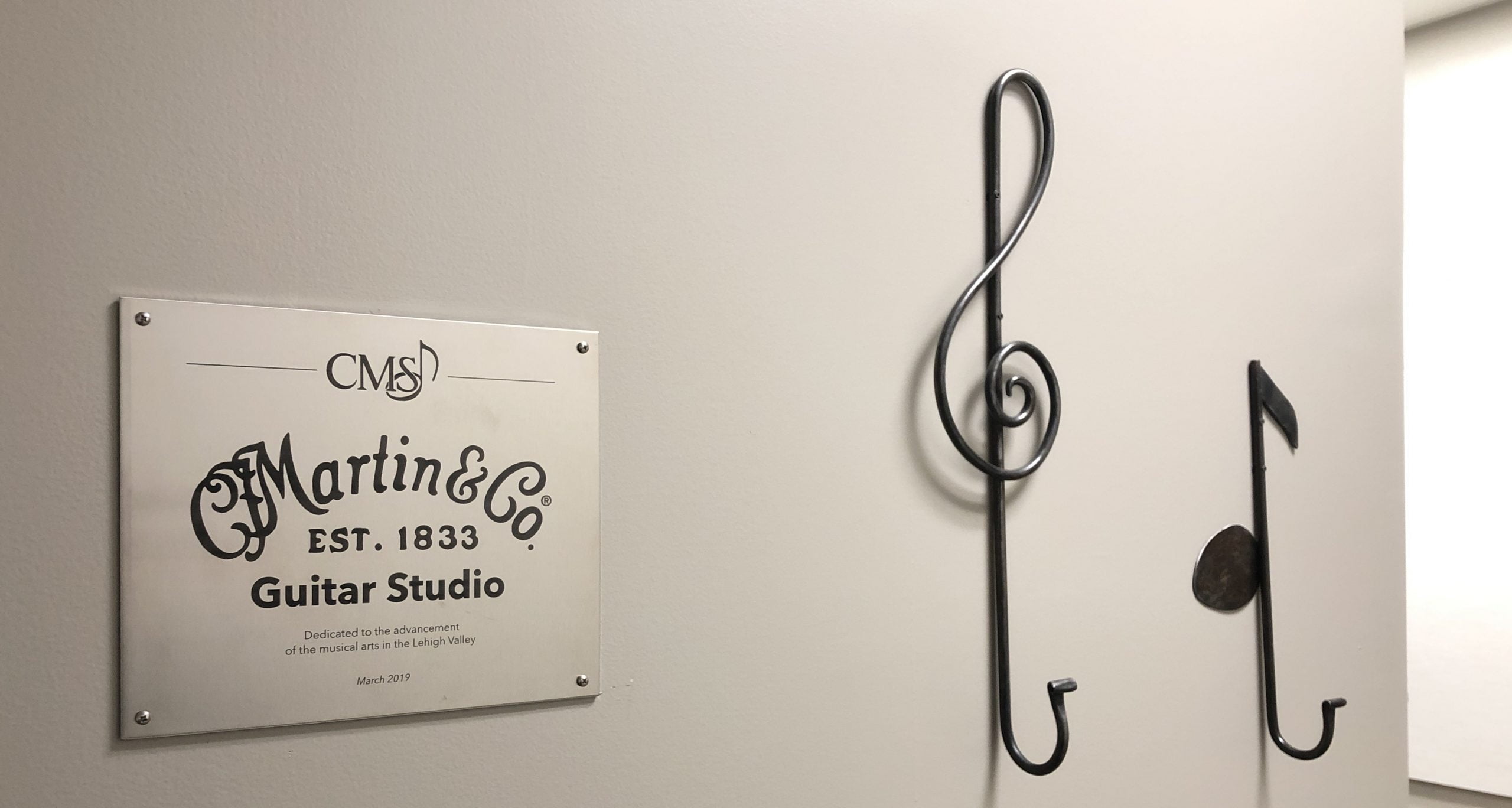
How do I pick a guitar teacher?
Tell us about your experience, musical goals, any special learning needs, and your availability. Our experienced staff will help match you with our best teacher to help you on your musical journey. Our teachers are all professional performing musicians with decades of experience in both performing and teaching students of all ages and abilities. All CMS teachers hold at least a bachelor’s degree in music performance, music education, or they have equivalent experience. Over 70% of our teachers hold a master’s degree or doctorate. They specialize in a variety of musical genres and teaching approaches, so whether your goal is to major in music in college or to just learn to play the guitar for your own enjoyment, we can match you with the best teacher for your needs.
“No matter what your musical goals are, I will show you the path to become the musician you aspire to be.”
Joe Wagner, CMS teacher
Learn more about our guitar teachers:
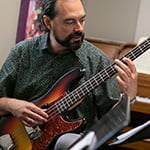
Joe Wagner
guitar | bass guitar | mandolin | composition | recording

M.M. Jazz Studies, University of the Arts, Philadelphia; B.M. Music Composition, Moravian University; Experienced educator, K-12 substitute teacher, & private music instructor focused on improvisation, traditional jazz, and gypsy jazz styles; owner, Keystone Sound Design; freelance composer for museum exhibits, television, & film; inventive guitarist leading several jazz ensembles & performing throughout Eastern PA. Learn more.

Dr. Andrew O'Connor
Double Bass, Bass Guitar

D.M.A. in Double Bass Performance, Eastman School of Music; double bassist, electric bassist, guitarist, & composer; Experienced in performing, touring, & recording in classical music, opera, musical theater, rock groups, jazz; Focus on modern music. Learn more.
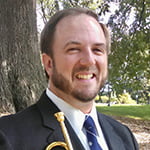
Chris Klump
guitar | trumpet
 B.A. Music, Moravian University; experienced brass and folk musician on guitar and trumpet, arranger, conductor, and music educator with all levels of learners; Performs with the South Side Brass, Mariachi Montaña del Sur, and the Peace Singers; Assistant Conductor, Marine Band of Allentown. Learn more.
B.A. Music, Moravian University; experienced brass and folk musician on guitar and trumpet, arranger, conductor, and music educator with all levels of learners; Performs with the South Side Brass, Mariachi Montaña del Sur, and the Peace Singers; Assistant Conductor, Marine Band of Allentown. Learn more.
What level guitar lessons are available?
30 Minute Lessons: Beginner
Beginner guitar players of all ages start with weekly 30-minute lessons to learn the basics of guitar, including proper technique, chords, rhythm, melody, and the essentials of efficient practice. Performance in recitals is encouraged, but not required.
45 Minute Lessons: Intermediate
Intermediate guitar players strengthen skills with weekly 45-minute lessons to expand on chords, harmony, and scales while building a repertoire of music. Students at this stage can greatly benefit by learning to play in a live solo or group setting.
60 Minute Lessons: Advanced
Advanced students refine technique and expand repertoire with weekly 60-minute guitar lessons. Advanced topics include improvised soloing, composition, and music theory. Students will learn the skills needed to be proficient in professional recording and live performance settings, as well as collegiate-level study.
How much do guitar lessons cost?
All guitar lessons start with a 30-minute interview or “trial” lesson, which costs $35 and must be paid in advance by credit or debit card. If you decide to enroll in lessons, the $45 annual registration fee and your first month’s payment (pro-rated, if applicable) will be automatically charged to the payment method on file in our student portal, TeacherZone. Then your monthly lesson payment will be automatically processed on the 1st of each month.
30-minute lessons – $140 per month
45-minute lessons – $204 per month
60-minute lessons – $268 per month
Need-based financial aid and merit-based scholarships are available for students age 18 and younger.
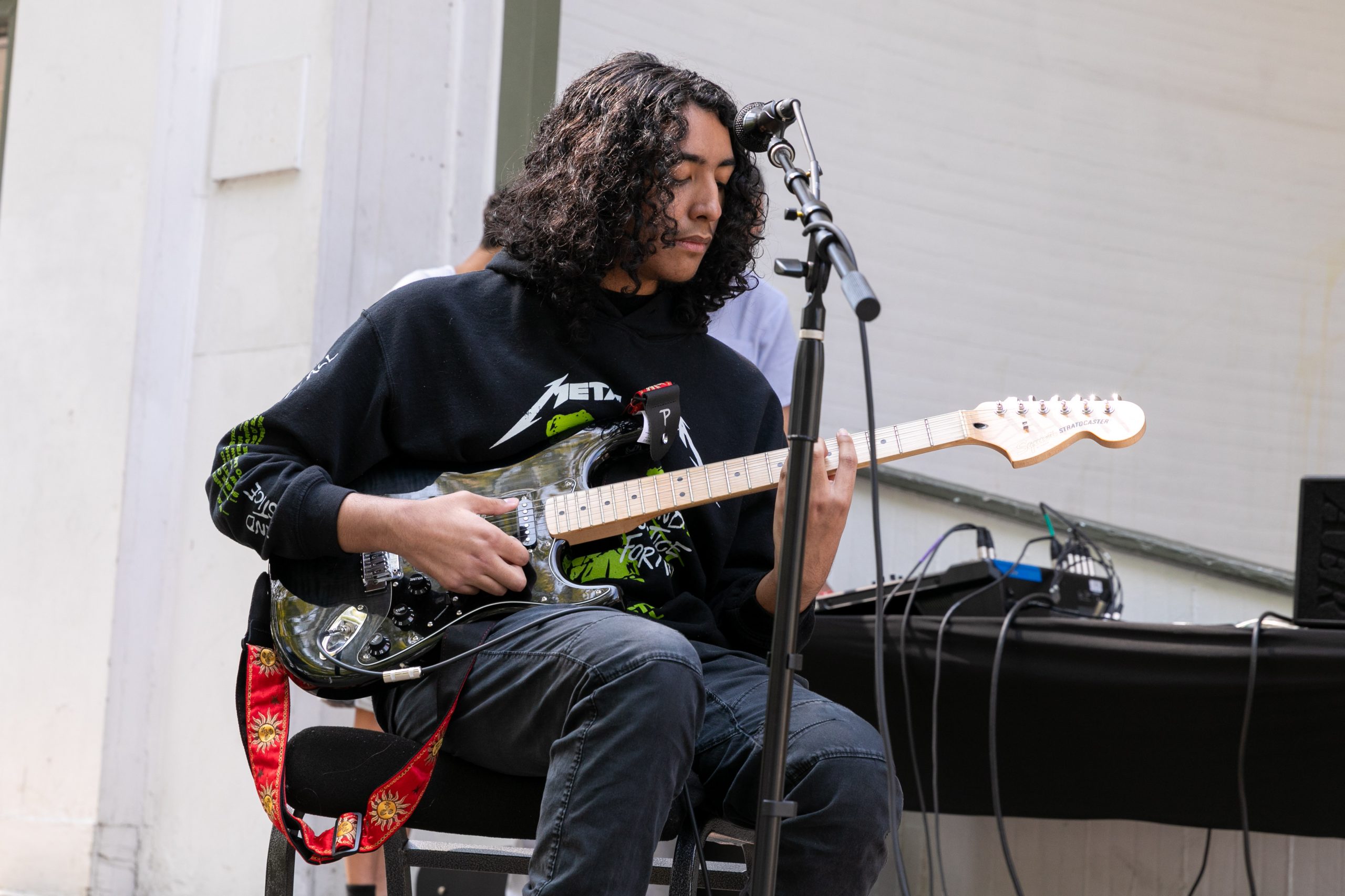
Do I qualify for financial aid?
As a nonprofit charitable organization, our mission is to make quality music education affordable to everyone. Financial aid is available only for students up to age 18, or for students who are 18 or 19 completing their senior year of high school. In accordance with Federal Poverty guidelines, CMS awards tuition assistance to each family on a sliding scale, based on household income and other financial factors. All families pay the annual registration fee and a portion of the monthly lesson tuition.
To apply, complete the online form and upload all required documentation. We recommend applying for financial aid before scheduling your interview lesson to confirm your monthly tuition before you enroll.

How do I get started?
New students are welcome to enroll anytime in both in-person or online lessons. Create your TeacherZone account and schedule your interview lesson here. TeacherZone is our online portal for lesson scheduling, payments, documents, and learning resources.
Sign Up for an
Interview Lesson
For the interview lesson, pick a teacher from the dropdown menu, and then you will be able to request a time from a list of that teacher’s available lesson times. If you would like us to contact you about your teacher and schedule options, just select “I’m not sure.”
Once we receive your online registration and payment, the office will reach out to you with any questions via phone or email. Our confirmation email will include all the details of your lesson, your teacher’s contact information, a Google Meet link (if it’s a virtual lesson), and your TeacherZone account (if you registered over the phone or via email).
If you have questions before enrolling online, call 610-435-7725 x404, or email registar@cmslv.org.
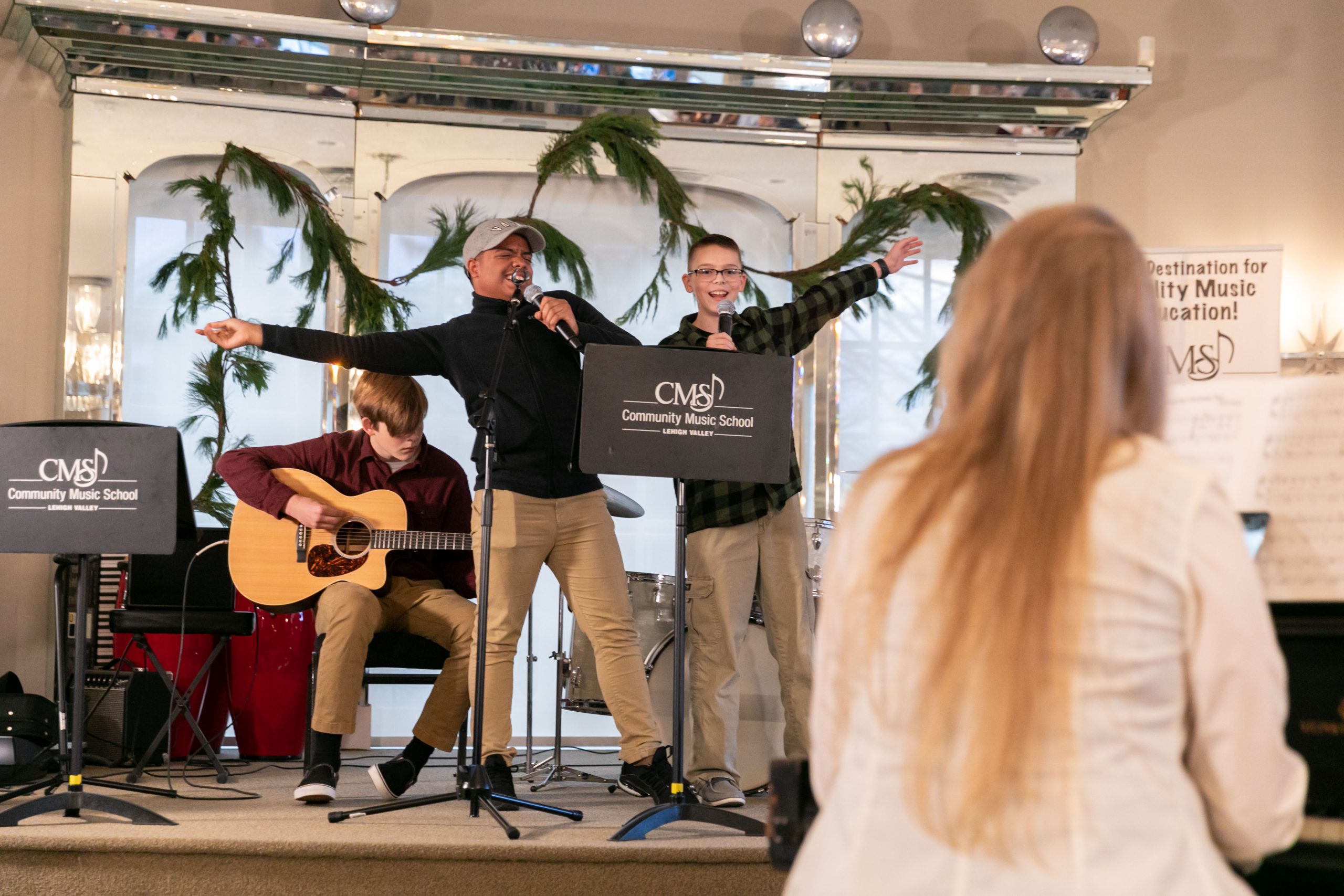
What to expect at the interview lesson
The interview lesson or trial lesson is an “interview” for the teacher as well as the student. Our goal is to match you or your child with the best teacher for your needs.
For children under age 12, we require that the parent attend the interview lesson with the child, as well as the first several lessons.
For in-person lessons, arrive at CMS, 1544 Hamilton Street, Allentown at least 15 minutes before your scheduled lesson time. We have free parking in the lot directly next to our building, which is handicap accessible. Our building is open to students, siblings, and parents only. When you ring the doorbell, the admin staff will verify your identity and grant you access. You must check-in at the front office and complete any needed paperwork. The teacher will come out to meet you in the lobby or lounge, or our staff will direct you to the correct studio for your lesson. Be sure to allow time to use the restroom and to wash your hands before your lesson.
For online lessons, at the time of your scheduled lesson, click on your teacher’s unique Google Meet link, which we sent to your email. Be sure to bookmark the link for future reference.
The interview lesson will include the following:
-
- Introduce the student and the teacher. We hope that this is the start of a life-long relationship focused on musical learning!
- Review the student’s musical experience
- Discuss the student’s musical goals and area of focus
- Evaluate the guitar and its tuning, if the student already has a guitar
- For beginners, demonstrate basic posture and finger position
- Evaluate knowledge of music theory and note reading skills
- Request that experienced players play a recent piece or sight-read a piece to establish their current playing level
- Discuss lesson books, exercises, and repertoire. Our teachers have an extensive library of materials to share. The teacher may ask you to download or directly purchase specific materials.
- Outline a general game plan for future lessons
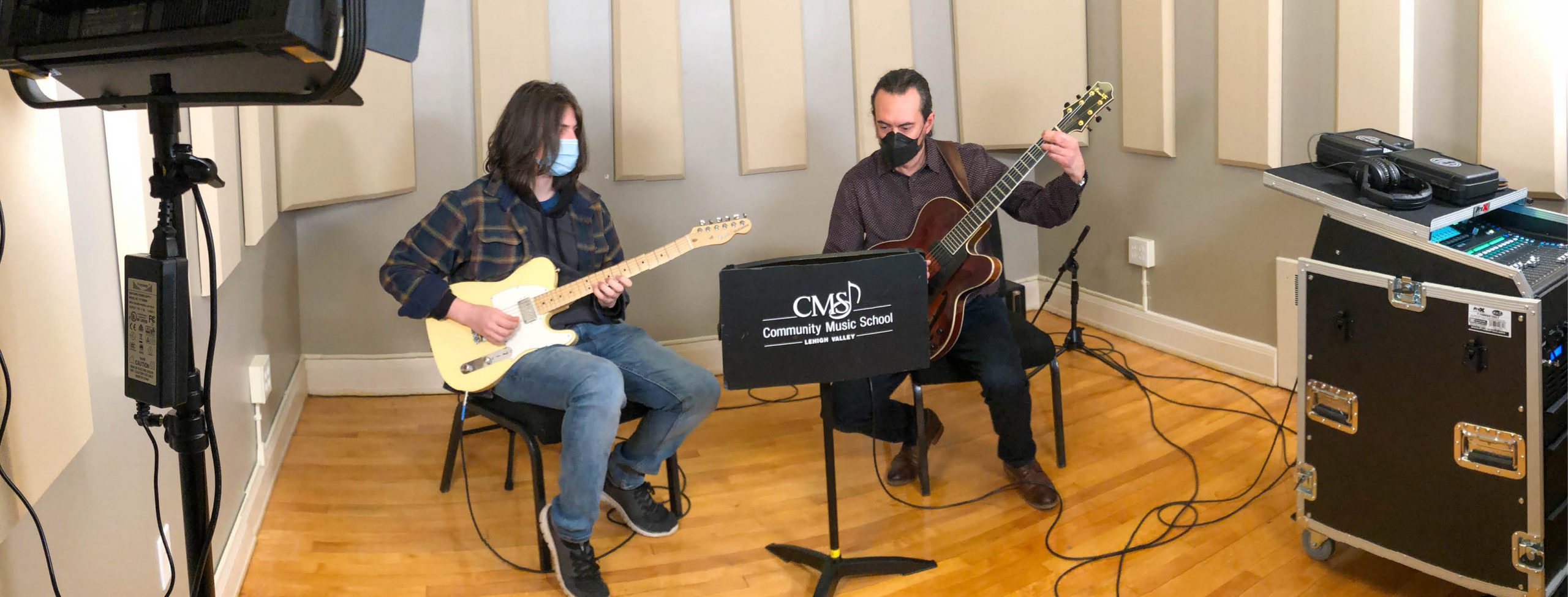
What to expect after the interview lesson:
Both the student/parent and the teacher will receive an email with the link to an CMS Student Enrollment Confirmation Form. This form must be completed before enrolling in lessons. Even if you decide not to enroll, we request that you complete the form.
You are welcome to interview with as many teachers as you like or to interview a second time with the same teacher before committing to lessons. Each interview lesson is $35.
To officially enroll, you will pay the annual registration fee and make your first month’s (prorated) payment with your on-file credit or debit card. Your regular automatic monthly payment will begin on the first of the following month.
When you enroll in regular lessons, you are committing to a spot on the teacher’s schedule for the same day and same time each week. This time is reserved especially for you, whether the lesson is in-person or online. If you need to reschedule a lesson, read more about our cancellation and makeup policy here.
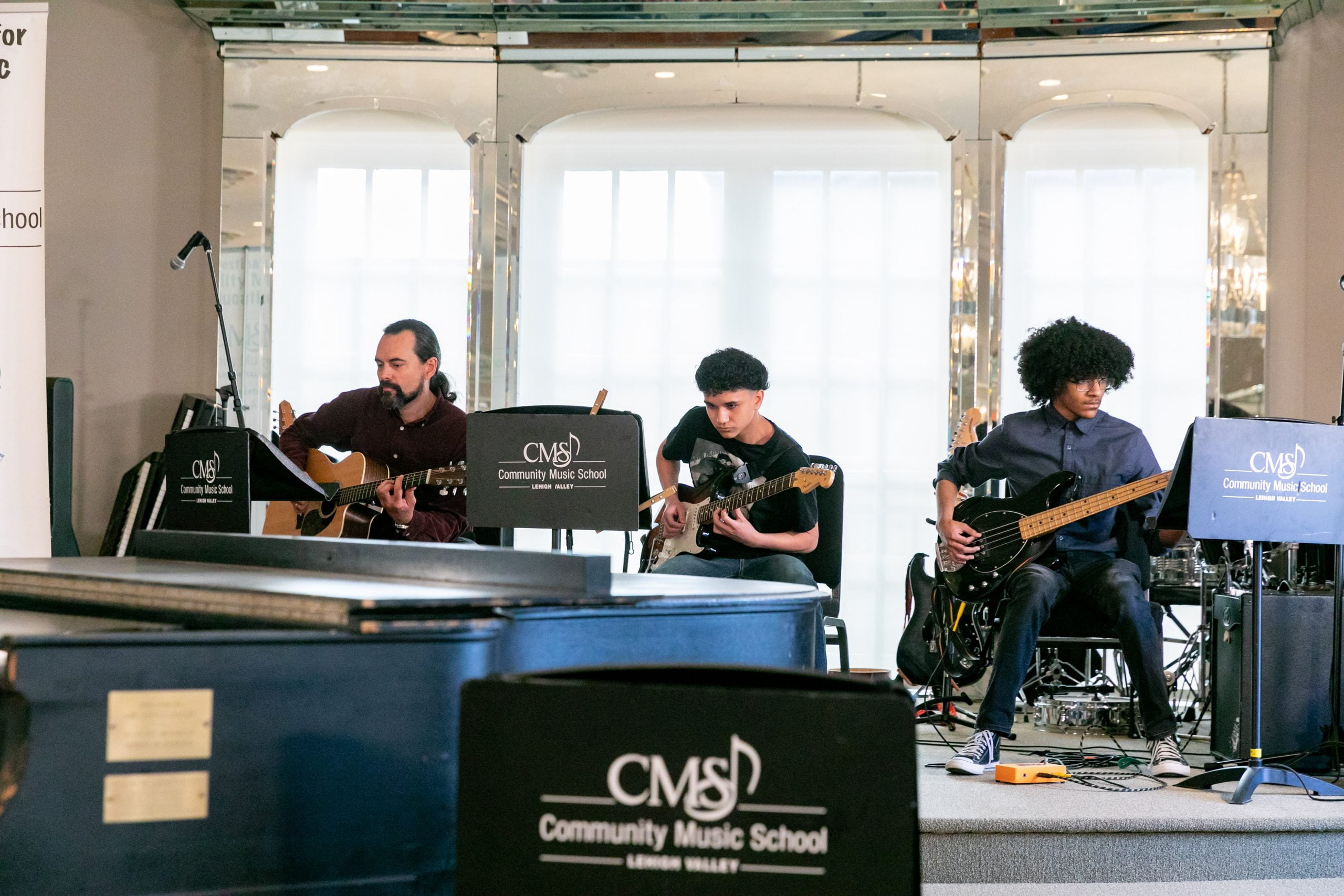
Do I have to perform?
No, but we hope you do! CMS offers numerous free public performance opportunities, including student recitals and community performances, such as Musikfest.
We encourage but do not require students to perform in our regularly scheduled recitals. We also offer group performance opportunities, such as in our Modern Band (teen rock band), House Band (advanced rock band), and Big Band (jazz) ensembles for middle school, high school, and adult students. Our collaborative learning environment facilitates plenty of opportunities for performing with other students or teachers. Students under age 18 also have the opportunity to audition for merit scholarships each spring.
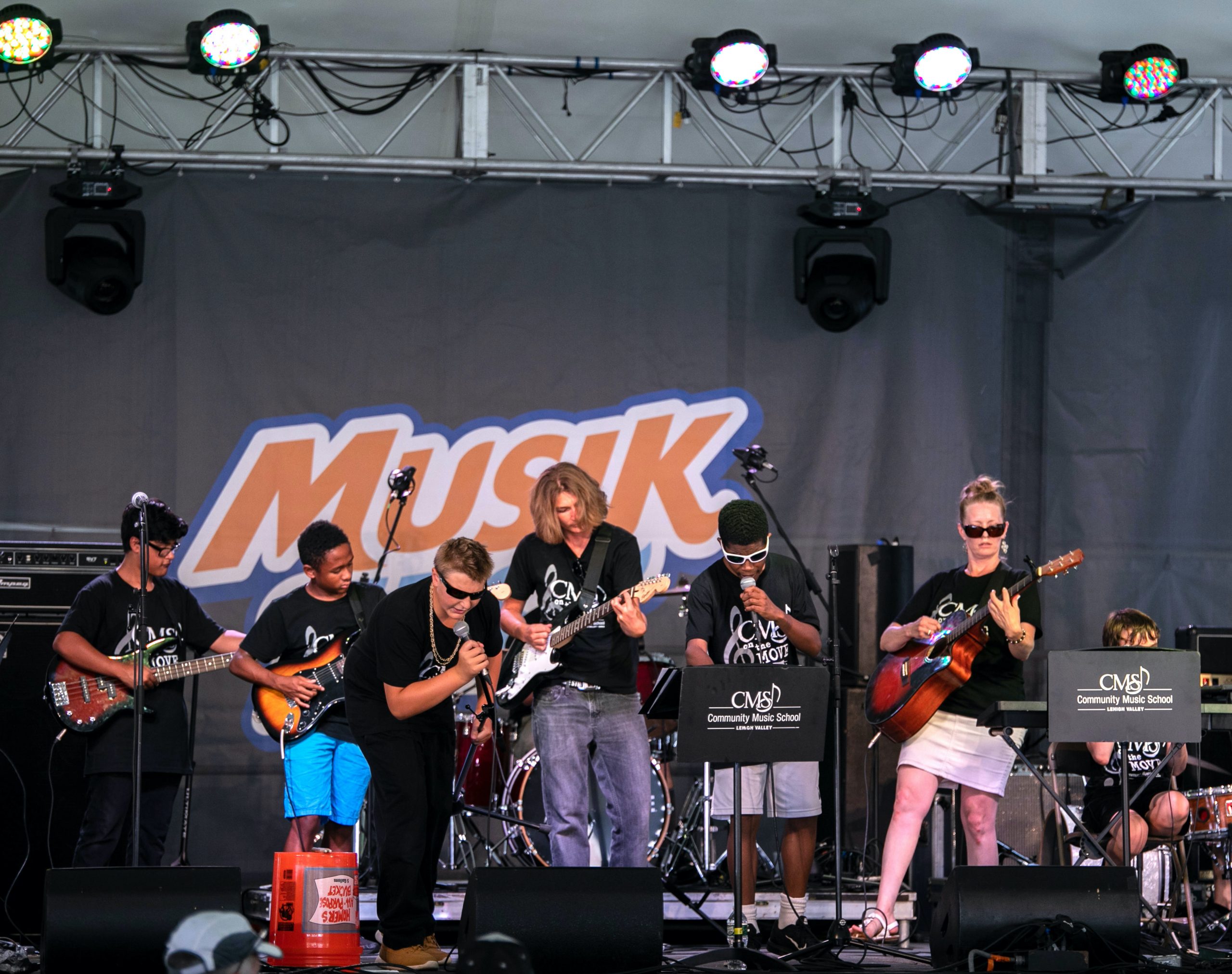
How do I know what events are coming up or if my lesson is rescheduled?
We send out a weekly “Music Notes” e-newsletter to all our students and faculty to keep you informed of upcoming recitals, events, and other important information about the school and your lessons. We list all student recitals and events on our website’s events page and Google Calendar. You can find detailed information on participating in virtual and in-person recitals on the Recital Guidelines page. You can also find Form links and information on our Student Resources page.
Our TeacherZone system sends out regular practice, schedule, and payment email notifications, tailored to your communication preferences. If your teacher needs to reschedule a lesson, you will be notified by phone, text, and/or email. There is also a handy TeacherZone student app for iOS and Android.
What if I change my mind?
Learning an instrument is a long-term commitment for both child and parent. Plan to give it at least 3-6 months to really try it out before determining whether the guitar is the right instrument for you or your child. If you decide to try another instrument or discontinue lessons, review the Withdrawal Policy and complete the Request to Withdrawal Form by the 15th of your final month, and your final lesson will be held at the close of that month.
Ready to Get Started?
Sign Up Now to select a teacher and schedule your interview lesson. If you are not sure which path is best for you or your student, please complete our Inquiry Form and someone will contact you to discuss your options. If you have any questions before enrolling, send us an email at registrar@cmslv.org. We look forward to helping you or your child grow on your musical journey!
Sign Up for an
Interview Lesson
